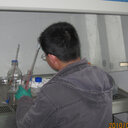Salvianolic acid A, a novel matrix metalloproteinase-9 inhibitor, prevents cardiac remodeling in spontaneously hypertensive rats.
Keywords
Abstract
Cardiac fibrosis is a deleterious consequence of hypertension which may further advance to heart failure and increased matrix metalloproteinase-9 (MMP-9) contributes to the underlying mechanism. Therefore, new therapeutic strategies to attenuate the effects of MMP-9 are urgently needed. In the present study, we characterize salvianolic acid A (SalA) as a novel MMP-9 inhibitor at molecular, cellular and animal level. We expressed a truncated form of MMP-9 which contains only the catalytic domain (MMP-9 CD), and used this active protein for enzymatic kinetic analysis and Biacore detection. Data generated from these assays indicated that SalA functioned as the strongest competitive inhibitor of MMP-9 among 7 phenolic acids from Salvia miltiorrhiza. In neonatal cardiac fibroblast, SalA inhibited fibroblast migration, blocked myofibroblast transformation, inhibited secretion of intercellular adhesion molecule (ICAM), interleukin-6 (IL-6) and soluble vascular cell adhesion molecule-1 (sVCAM-1) as well as collagen induced by MMP-9 CD. Functional effects of SalA inhibition on MMP-9 was further confirmed in cultured cardiac H9c2 cell overexpressing MMP-9 in vitro and in heart of spontaneously hypertensive rats (SHR) in vivo. Moreover, SalA treatment in SHR resulted in decreased heart fibrosis and attenuated heart hypertrophy. These results indicated that SalA is a novel inhibitor of MMP-9, thus playing an inhibitory role in hypertensive fibrosis. Further studies to develop SalA and its analogues for their potential clinical application of cardioprotection are warranted.




